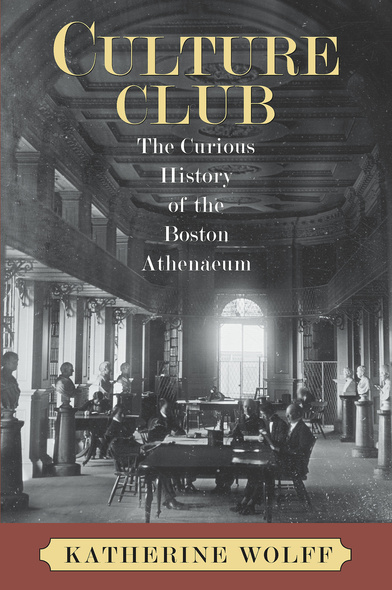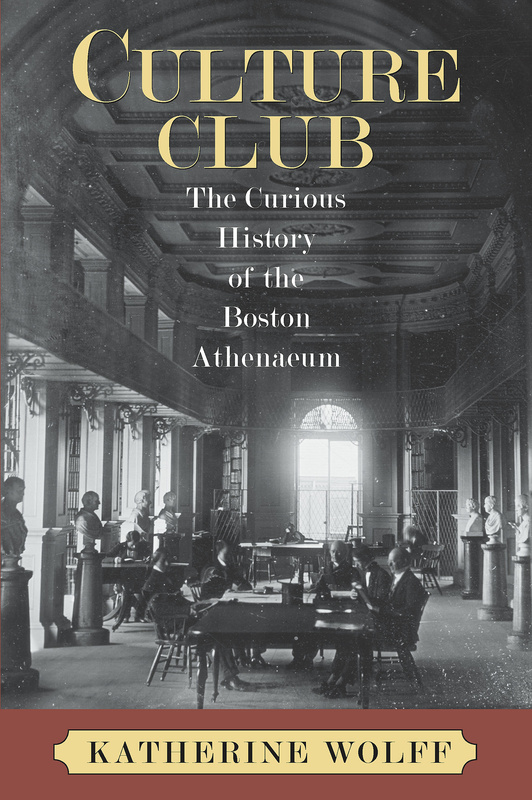Culture Club
The Curious History of the Boston Athenaeum
University of Massachusetts Press
Founded in 1807, the successor to a literary club called the Anthology Society, the Boston Athenaeum occupies an important place in the early history of American intellectual life. At first a repository for books, to which works of art were later added, the Athenaeum attracted over time a following that included such literary luminaries as Ralph Waldo Emerson and Henry James.
Yet from the outset, Katherine Wolff shows, the Boston Athenaeum was more than a library; it was also a breeding ground for evolving notions of cultural authority and American identity. Though governed by the Boston elite, who promoted it as a way of strengthening their own clout in the city, the early Athenaeum reflected conflicting and at times contradictory aims and motives on the part of its membership. On the one hand, by drawing on European aesthetic models to reinforce an exalted sense of mission, Athenaeum leaders sought to establish themselves as guardians of a nascent American culture. On the other, they struggled to balance their goals with their concerns about an increasingly democratic urban populace. As the Boston Athenaeum opened its doors to women as well as men outside its inner circle, it eventually began to define itself against a more accessible literary institution, the Boston Public Library.
Told through a series of provocative episodes and generously illustrated, Culture Club offers a more complete picture than previously available of the cultural politics behind the making of a quintessentially American institution.
Yet from the outset, Katherine Wolff shows, the Boston Athenaeum was more than a library; it was also a breeding ground for evolving notions of cultural authority and American identity. Though governed by the Boston elite, who promoted it as a way of strengthening their own clout in the city, the early Athenaeum reflected conflicting and at times contradictory aims and motives on the part of its membership. On the one hand, by drawing on European aesthetic models to reinforce an exalted sense of mission, Athenaeum leaders sought to establish themselves as guardians of a nascent American culture. On the other, they struggled to balance their goals with their concerns about an increasingly democratic urban populace. As the Boston Athenaeum opened its doors to women as well as men outside its inner circle, it eventually began to define itself against a more accessible literary institution, the Boston Public Library.
Told through a series of provocative episodes and generously illustrated, Culture Club offers a more complete picture than previously available of the cultural politics behind the making of a quintessentially American institution.
A well-researched, engagingly written book. It moves beyond the usual class-based interpretation of elite Boston institutions to consider other sources of motivation and influence and other historical issues.'—Tamara Plakins Thornton, author of Cultivating Gentleman: The Meaning of Country Life among the Boston Elite, 1785–1860
'Historian Katherine Wolff's worthy Culture Club: The Curious History of the Boston Athenaeum explores the development of an alternative social model for information access. . . . The entire book provides a fascinating picture of the development of cultural institutions in the United States. . . . Overall, for those interested in the ways in which access to information developed in the United States, Wolff's book is a valuable contribution.'—Library Quarterly
'Wolff has given us a well-written study of a Boston institution, a work that firmly situates it within the artistic, bibliophilic, social, and cultural attitudes and struggles of its time.'—Resources for American Literary Study
''Culture Club: The Curious History of the Boston Athenaeum' tells of a literary club called the Anthology Society and its successor, the Boston Athenaeum, that began as a repository for books and works of art but grew to attract major American literary figures. . . . 'Culture Club' tells this history through a series of episodes and offers a fine picture of the politics and social interactions surrounding the institution. College-level American history and literary collections need this.'—Midwest Book Review
'A very readable and welcome addition to the history of America's cultural institutions.'—American Archivist
'This well-researched study is both satisfying and erudite, itself symbolizing the institution it illuminates within its pages. Wolff concludes that 'the simple dedication to gather for aesthetic, intellectual and social refreshment is perhaps the Athenaeum's greatest legacy' and suggests that the Athenaeum continues to provide an alternative to what she perceives as the increasingly solitary pursuits of Americans. Her book offers the reader the same, an intellectual and literary refreshment in the company of an articulate and knowledgeable guide.'—Historical Journal of Massachusetts
An independent scholar, Katherine Wolff received her PhD in American literature and history from Boston University





